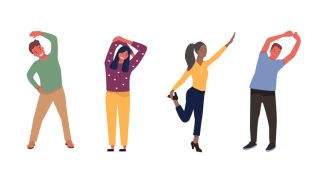ADHD
ADHD and Effective Motivation Strategies
How to move from procrastination to productivity
Updated October 20, 2023 Reviewed by Davia Sills
Key points
- Put the have-to task before the want-to task
- Create meaningful incentives to begin, sustain and finish something
- Break big tasks into smaller, more manageable ones
- Motivation benefits from encouragement so notice your progress and accomplishments

Do you see a pile of unfolded laundry, turn around, and run away? Are you feeling like your get-up-and-go took off and left for Bermuda? If so, you share something in common with many other adults with ADHD: avoiding unpleasant activities in which you lack interest.
Yet, there comes a time when a task can't be avoided any longer. Worried and possibly panicked, adrenalin usually kicks in and lights a fire of motivation under you to get started. But this last-minute "let's get started or else" produces huge amounts of unhealthy stress for your mind, body, and emotions.
In general, people with ADHD benefit from putting the have-to task before the want-to task and gathering meaningful incentives to begin, sustain, and finish something. But sometimes, you just don't feel like doing the "have-to" thing. You're tired; the task seems insurmountable; it's boring to stop what's fun. Why write a boring report now when you can watch something cool on YouTube? But, if you watch YouTube, then your anxiety will rise, you'll depend on that adrenalin to get your work done (often at the last minute), and then the report may not show your best effort.
That's why the have-to's need to go first with small breaks to reset until you arrive at the bigger prize when you are finished—your want-to. Setting this up and sticking with it can be complicated and tough for folks with ADHD, which is why they struggle with productivity. Here are some organizing tips for ADHD adults who are ready to energize their potential and pivot to more productivity.
Shifting your perspective to give yourself a chance
While procrastination can be debilitating, the negative self-talk about your lack of motivation, organization, and planning can be downright toxic. When your inner critic rages at you for all of the things you aren't doing and all of the ways that you don't measure up, overwhelm sets in. It's easy to feel hopeless, stuck, and unable to gather up whatever strength you have to initiate anything.
Here's the good news: You can change your circumstances by shifting your perspective about living with ADHD and getting started on things. Instead of repeating what's wrong with you or what you can't do, what would it be like to think about something that you are good at? Something that you like to do? What's one small action that you could take to begin your path toward productivity?

Utilize incentives to get moving.
Incentives are key to productivity for folks with ADHD. Build incentives into your process to rest and renew your motivation to continue the task at hand. You can choose to take a 10-minute break every hour or do something pleasant after completing each item on your list. Leave yourself some breadcrumbs: Jot down ideas that you have about where you are going with your thinking, or name some next steps. These notes will help you refocus and ease back into working when you return. You know yourself best, so choose the incentives that are right for you.
Here are some reward ideas to keep your motivation up:
- Step outside for a few moments.
- Take a walk.
- Listen to music.
- Call or text a friend.
- Enjoy a coffee break.
Reducing procrastination in ADHD adults
Procrastination can be debilitating for folks with ADHD. It can affect work, intimate relationships, and friendships, as well as self-esteem. Here are some ways that you can tackle procrastination:
1. Reflect on your own patterns of procrastination.
There are three types of procrastination:
- Perfectionism — "I have to get it right, or I won't do it."
- Avoidance — "I hate doing this thing; it seems impossible, so why bother trying?"
- Productivity — "I'm going to do other things that need to get done and feel good, but stay away from the bigger thing that I don't like."
Take some time to consider the ways that you procrastinate. Do any of the three types of procrastination resonate with you in particular? Does more than one? Which thoughts or beliefs come up for you when you think about why you might procrastinate? When you understand your patterns of procrastination, you'll feel more empowered and prepared to decrease your delay tactics.
2. Break big tasks into smaller, more manageable ones.
Procrastination for people with ADHD is often related to anxiety and a failure mentality. The best way to combat procrastination is to break things down into small, doable chunks that seem more manageable. Breaking things down into parts makes them more manageable to attempt because you are asking yourself to do a smaller task.
Think of something that you are putting off. How can you break this down into little parts, and which one piece can you start with? If you still can't initiate, the part isn't small enough.
Instead of putting all of the socks together, what about just folding one shirt? You might think this is ridiculous. That's OK; it's just your inner critic trying to thwart you again. Activate your inner coach instead, and tell that voice to take a seat and zip it while you experiment. This trial approach builds your confidence one step at a time because you are performing something instead of avoiding it.
3. Keep the tasks engaging.
Keep yourself engaged in a task by adding something fun to it—music, talking with a friend, co-working. It's tough for unmotivated ADHD brains to get started on something that seems tedious and boring. What can you do to liven things up a bit? Change the order of tasks, take timed movement and snack breaks, switch locations for working, offer yourself an enticing incentive, or find an accountability buddy. Create realistic goals—ones that you can actually meet and want to achieve.

Acknowledge your achievements.
Motivation benefits from encouragement, and this is especially true for neurodivergent people. Take the time to notice your progress, which is just as important as noticing your accomplishments. Instead of "Why haven't you finished that?" try acknowledging what you have done with "I've gotten started. I threw away the junk mail. Cool." Lean into your inner coach to keep trying and growing.
When people with ADHD specifically acknowledge their efforts, they nurture their positivity and promote the changes they desire. The ideal positivity ratio should be three positives for every negative statement. Is this what you are giving to yourself? Start today by catching yourself doing something you're proud of and pivot from disengagement to productivity.
References
Fredrickson, B. L. (2009). Positivity. New York: Three Rivers Press. (p. 32).
Duan, H., Fernández, G., van Dongen, E. et al. The effect of intrinsic and extrinsic motivation on memory formation: insight from behavioral and imaging study. Brain Struct Funct 225, 1561–1574 (2020). https://doi.org/10.1007/s00429-020-02074-x




